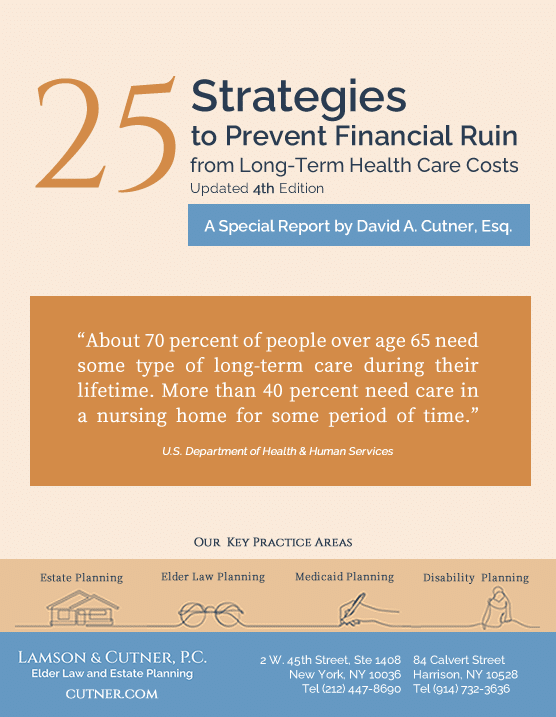This is Strategy #5 from Lamson & Cutner’s publication, “25 Strategies to Prevent Financial Ruin from Long-Term Health Care Costs.” Click here to see the other strategies.
Even if you’re already in a nursing home and are paying for care privately, it’s not too late to initiate effective planning so that Medicaid covers your bills. In most instances, there are still procedures you can use to shield a substantial portion of your money and assets. You may be able to save as much as 40% to 50% of what you have.
Similarly, if your physical condition has deteriorated to the point where it’s now obvious that you will soon require home or nursing facility care, you can take steps to preserve your financial resources, and to protect your house, condo or co-op. In fact, you’re likely to be surprised by the advantages that remain available to you.
Here’s an example of a case in which we helped a couple protect significant liquid assets. These results were obtained even though the planning was done after it became clear that professional care was necessary. Our client was in her 80’s, suffering from Parkinson’s disease. After several strokes, seizures, and other serious complications, she became uncommunicative. Up to this point, all assets were held jointly with her husband. We arranged for everything to be transferred to him. This safeguarded the money from loss by “spend down,” under Medicaid eligibility requirements.
We then filed an application for Medicaid nursing home benefits for the wife, which was approved. The assets held by her husband were then placed in a special trust. The beneficial end result: the couple’s money was protected. It is now available to supplement the wife’s care in the nursing home, and to help maintain the husband’s lifestyle. Again, these advantages were obtained with asset protection strategies that were implemented, in effect, “at the last minute.”
Note: When assets are transferred to a “well spouse” in order to achieve benefits for an “ill spouse,” Medicaid can later ask for reimbursement of their expenses from the well spouse. While this is a risk, it is still cost-effective for the minimum reason that Medicaid will ask to be reimbursed at the Medicaid rate, which is lower than the rate the spouse would have paid privately.
visit our key practice areas


